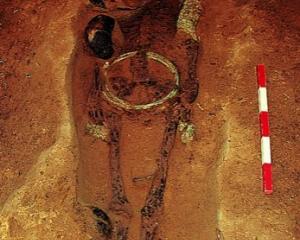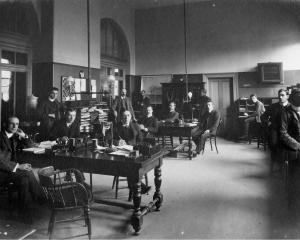You’ve read it at least three times, you refer back to it regularly to deal with all sorts of life issues, and you lend it to friends and demand, in a slightly alarming way, they read it — it is The Best Book in the World. Today, our final three writers explain what is their Best Book in the World, and why.
 Cushla McKinney
Cushla McKinney
Cushla McKinney
Cushla McKinney

How does one define the best book in the world? Let me count the ways: It is the first I remember reading and the last. The one I have forced on the most people and the one least frequently returned. It is the one I reread most often and the one I dare not reopen lest it lose its original magic. The book I have just finished and the one I am about to start.
Asking me to choose is like asking me which daughter I love most, so I guess the answer is obvious. The best book(s) in the world are those I bought my nascent first-born the moment I fell pregnant: Tove Jansson's Moomintroll series.
These stories, more than any others I have read, encapsulate everything most magical about childhood. For a start, there is the cuteness factor of the Moomins themselves; there is not a child alive who could resist the company of a living, breathing soft toy, and it is little wonder that these small, fluffy, hippopotamine creatures are as popular in Japan as in their native Finland. But it is the world Jansson has created that makes these books so particularly special. This is a place where eggshells thrown into a Hobgoblin's hat re-emerge as clouds and books as words made animate. Where adults are not, as in so many children's books, permanently AWOL, but absent when desired and there when needed. Where Moomintroll and his friends can embark on their adventures armed with sandwiches, lemonade and their parents' blessing, safe in the knowledge that home is just around the corner whenever they want it most.
This is no fairy-tale paradise, however, but a place where the sunshine is tinged with autumnal melancholy and the solitude of twilight, a world that piques children's curiosity and satisfies their desire to be frightened without being frightful. Even the most fearsome of monsters, the icy Groke, is driven by the desire for warmth and companionship rather than malice. The natural dangers the characters face - comets, floods and storms at sea - are opportunities for adventure as much as sources of peril, and there is no crisis that Moominmamma cannot resolve with the contents of her handbag.

In fact, one of the most delightful features of the books is their celebration of diversity. Everyone is welcome in Moominhouse, from the Ancestor that lives under the stove to the numerous waifs and strays that find their way to the kitchen table and into the family.
Like all good children's stories, the Moomintroll books also contain much for the forcibly-coerced adult reader to enjoy, from the nihilist Muskrat philosopher who is first into the metaphorical lifeboat when danger threatens to the mysterious Hattifattiners who resemble nothing so much as a herd of inflated condoms with arms. Not to mention Mrs Fillyjonk, whose lifelong sense of existential dread evaporates when her picture-perfect home is swept away by a tornado. What woman, I ask, has not secretly dreamed of such freedom?
They are also a marvellous repository of inspirational sayings - just Google "Moomintroll quotes'' if you don't believe me - and, even more delightfully, you can use your familiarity with the work of a relatively obscure Finnish author as means of intellectual virtue-signalling.
How I love exclaiming incredulously: "You haven't read Moomintroll???'' when asked why my second daughter's middle name is My (although the literary gods have punished my hubris by invoking nominative determinism; she is every bit as mischievous as her diminutive namesake). But get in quick because a new English TV adaptation has just been released, rendering this particular perk time-limited. And if your children are of the book-hating variety, there are Moomin comics with which to tempt them, and a plenitude of tie-in merchandise to boot.
Still not convinced that the Moomintroll books are the best in the world? Then read them yourself and rediscover the mysterious and wonderful world of childhood, where new discoveries await at every turn and there is nothing that can't be solved by a tummy full of pancakes and a Hygge. If this doesn't change your mind, then, in the immortal words of the Muskrat, "I have every respect for your deductions, but you are wrong, completely and absolutely, without any doubt''.
Cushla McKinney is a mother, scientist and long-time book reviewer.
 Lynley Edmeades
Lynley Edmeades
Lynley Edmeades
Lynley Edmeades

Many years ago, I spent some time backpacking around France.
When I was not bumming around cheap cafes, smoking cigarettes and reading Simone de Beauvoir paperbacks, I would bide my time as a Willing Worker on Organic Farms, aka a wwoofer. It was a good way of stretching a meagre budget: in return for helping out with labour, wwoofers are given free board and rent.
I spent a few weeks on a vineyard in Parleboscq, a small settlement about halfway between Bordeaux and Toulouse.

My dwelling was a caravan about a paddock's distance from the old chateau.
I would wake every morning to belligerent geese squawking outside my door, or to one of the two very sweet children knocking on the door to say le petit dejeuner est pret.
I was happy to have the space to myself; the days were long and there was not much in the way of independence.
I had recently begun my forays into writing, and while I was enjoying being in this idyllic place, I really just wanted to be alone to read and write.
The hours I snatched to myself were treasured - the hour or so of post-lunch rest before I'd hear Philip start the tractor up again, or the few hours after supper before collapsing into a heap on my fold-out bed.
I spent the days with Philip.
He did most of the manual labour, while Sandra home-schooled their two young children.
An introspective man, I found Philip pleasant company.
He seemed to like the pastoral quietness and talking didn't seem to excite him much.
He did like talking about literature though, and once he learned I was interested in books too, that topic would take up most of our conversation.
One morning after breakfast Philip informed me that our work for the morning was to go searching for small oak saplings.
We walked the farm's periphery, with a wheelbarrow and a spade each, in search of these young plants that had seeded from acorns.
Philip was going to replant them, he told me, along the length of the driveway.
The work meant slow meandering, with a close eye to the ground, looking for these little plants, reaching out to the light through the surrounding grass.
"What have you been reading?'' asked Philip.
I had, from memory, been working my way through the existentialists, probably some Kafka, maybe some George Orwell. "And you want to write poetry?'' he inquired.
"I think so,'' I replied, with more question than answer in my voice.
"Well, if you want to write poetry, you need to be reading poetry.''
I felt both chastised and informed.
I did want to write poetry, but I was very loathe to admit it; I knew I was already teeming with cliches, and while poetry had moved me beyond anything else I'd read, I was still too protective of it to admit my vulnerabilities to this learned Englishman.
That evening, after taking my shower, I returned to the caravan to find a copy of Raymond Carver's All of Us sitting on the edge of my bed.
There was a note peeking out from inside the cover: Read this book. It will change your life.
I was immediately sceptical: who was this man, who had known me for less than two weeks, to tell me a book would change my life?
What an arrogant prick.
Carver's poems, like the short stories that I would later discover, are minimal, obscure and at times, indulgent.
He's not technically adroit, nor does he seem to care.
Instead, he's writing of a life lived, often struggled through, and hard won.
There are poems in here that I have come to swear by, almost 20 years later.
Reading All of Us was the first time in my life that poetry made me breathless; made me feel like someone was saying you're OK, look, I've had those thoughts too.
Poems that give me license to live, which to my mind, is all I can ever hope for from poetry.
"What did you think?'' Philip asked a few days later, while he poured the breakfast tea.
"It's good,'' I said, followed by something timid like, "it's interesting.''
Philip smiled a small smile out of the corner of his mouth.
I sense he knew he'd succeeded, but I wasn't going to indulge him in the truth so quickly.
Maybe I wasn't ready to talk about it yet.
But the truth is, he was right: that night, I went to bed with All of Us, and it did, actually, change my life.
Lynley Edmeades has a PhD in sound and technology in the avant-garde poetics of Gertrude Stein, John Cage and Caroline Bergvall. Her scholarship, poetry and essays have been published in the US, Europe, Australia and New Zealand. Her first collection of poems, As the Verb Tenses, was published by Otago University Press in 2016, and her second collection, Listening In, is due out in September 2019 (also with Otago University Press).
 Rob Kidd
Rob Kidd
Rob Kidd
Rob Kidd

Not only is this the best book in the world, it also saved my life.
This may sound like the sort of exaggerated introduction to shamelessly spark your interest.
But it's true.
Honestly.
Do read on.
It was 2002, I was a second-year English literature student and I hated books.
They piled up by my bed unread like little cairns of unrealised potential.
Stupid words, barely English; even the covers were boring.
Beowulf, Dream of the Rood - this wasn't what I had signed up for.
Except it was, if I'd read the course synopsis.
Anyway, there were better things to be doing than reading.
Like drinking.
I drank for pleasure, I drank to celebrate, commiserate, procrastinate.
Mostly I drank because I liked it.
But it didn't like me.
After two years of it I was bleeding out of places I should not have been bleeding from.

Meanwhile, I had missed the sign-up for optional courses and had been arbitrarily thrown into the one with least interest.
"Post-War Writing in Eastern Europe''.
Even among the desolate swamp of the curriculum, this sounded bleak.
Like all the best things though, it came from a mistake, a coincidence.
There was a poster of Milan Kundera on the tutor's wall and his was the first book on the reading list: The Book of Laughter and Forgetting.
The Czech author had kind eyes and the sort of knowing half-smile that breathed you in.
The Book of Laughter and Forgetting. I had done plenty of both of those things in the boozy haze that led me to that point.
Maybe it was a sign.
I read it and I cried.
It felt like finally hearing some sort of transcendent truth of literature that had been promised for so long.
The book is split into seven parts but never feels disjointed.
Kundera himself says it more eloquently than I ever could: "This book is a novel in the form of variations. The various parts follow each other like the various stages of a voyage leading into the interior of a theme, the interior of a thought, the interior of a single, unique situation the understanding of which recedes from my sight into the distance. It is a book about laughter and about forgetting, about forgetting and about Prague, about Prague and about the angels.''
He is a master at defining the human condition but not just the big stuff.
It's the weirdness, the quirks that Kundera explores best; the stuff you didn't really know was there until he draws the curtain.
Yet the most mind-blowing lesson of all was "litost''.
Litost.
Maybe I'll get it tattooed across my chest one day to remind me of the shortcomings of the English language.
Kundera introduces it as an "untranslatable Czech word''.
Untranslatable? Outrageous.
He continues: "I have looked in vain in other languages for an equivalent, though I find it difficult to imagine how anyone can understand the human soul without it.''
The concept that there were emotions, states, circumstances that were indefinable in our language floored me.
It still does a bit.
The world never seemed so big.
The best Kundera can do is this: "Litost is the state of torment created by the sudden sight of one's own misery.''
It possibly beats my best effort of: "a metaphysical shame sandwich''.
Like recounting a great dream, it never sounds as good when you verbalise it.
The more I try to say about the book the less I will do it justice and I'll spoil the surprise for anyone yet to discover this masterpiece.
If that's you. God, I'm so jealous of you getting to read this for the first time.
The Unbearable Lightness of Being will always be Kundera's most loved and best-known work and that's fine with me.
The Book of Laughter and Forgetting has been described as "the most secret of Kundera's novels''.
And here I am letting you in on it.
Back to 2002; I learned to read again and love reading again.
Had it not been for this book I can only assume I would've failed my degree and drunk myself into oblivion.
Now my blood usually stays inside my body and Kundera sits on my bedside table and reminds me why that's important.
Rob Kidd is ODT books editor and court reporter.












